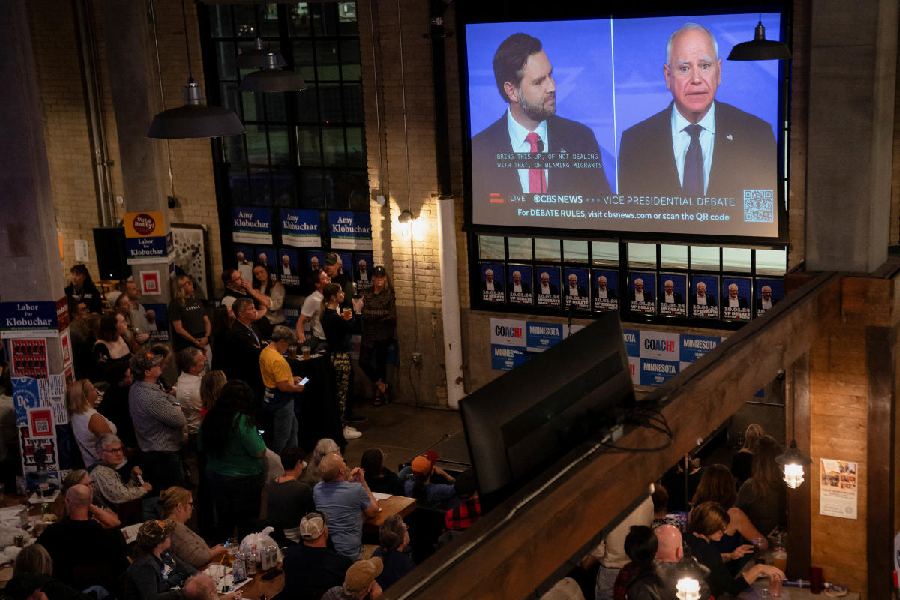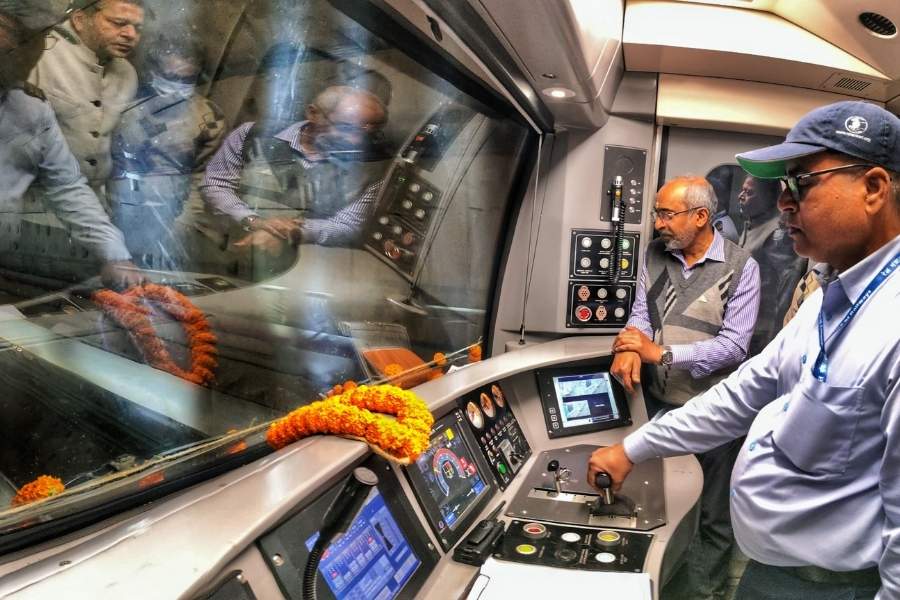 Wednesday, 22 January 2025
Wednesday, 22 January 2025
 Wednesday, 22 January 2025
Wednesday, 22 January 2025
U.S. Senator JD Vance, Republican Donald Trump's pick as his vice presidential running mate, squared off against Minnesota Governor Tim Walz, who Democrat Kamala Harris tapped to be her No. 2, in a nationally televised debate on Tuesday.
The debate is likely the final one of the 2024 presidential campaign, potentially giving it some additional weight ahead of the November 5 election.
Here are some takeaways from the event in New York:
Bob and Weave at the opening bell
The first question of the debate related to the ongoing conflict in the Middle East, asking both men if they would support a preemptive strike by Israel on Iran to disrupt the development of the latter's nuclear program.
Neither candidate was eager to answer.
A visibly nervous Walz dodged the question, pivoting to a critique of Trump's record during his four years in office.
"What's fundamental here is that steady leadership is going to matter," Walz said. "It's clear, and the world saw it on that debate stage a few weeks ago, a nearly 80-year-old Donald Trump talking about crowd sizes is not what we need in this moment."
Vance appeared to rib Walz for not addressing the question head on, but then segued into a description of his biography.
"My mother required food assistance for periods of her life," said Vance, who grew up in a working-class Ohio household.
Vance did eventually circle back to the question, saying a second Trump administration would support Israel's decision on the matter. But not before he offered an extended defense of Trump's foreign policy, characterizing his time in office as extraordinarily peaceful.
In the opening exchange, at least, the candidates were less eager to dive into policy details than they were in litigating Trump's legacy and introducing themselves to Americans.

Seeking a moment
Walz was asked about a report on Tuesday that he was not in China during the violent 1989 Tiananmen Square crackdown, as he had previously claimed.
“I’m a knucklehead at times,” he said. “I got there that summer and misspoke on this. So I was in Hong Kong and China during the democracy protests, and from that I learned a lot about what it means to be in governance.”
Vance, meanwhile, defended his running mate despite having criticized Trump ahead of the 2016 election.
“I was wrong about Donald Trump,” he said. “I was wrong, first of all, because I believe some of the media stories that turned out to be dishonest fabrications of his record. But most importantly, Donald Trump delivered for the American people.”
Despite Vance’s having written “Hillbilly Elegy,” a popular 2016 memoir, U.S. voters have a negative view of him, Reuters/Ipsos polling shows, with 51% of registered voters saying they view him unfavorably, compared with 39% who view him favorably. Meanwhile Walz was viewed favorably by 44% of registered voters, with 43% reporting an unfavorable view in the Sept. 20-23 poll.
The 'Harris Administration'
Joe Biden has been president of the U.S. for almost four years, but you would never have known that listening to Vance. And that was by design.
Early in the debate, Vance continually implied that Harris, as vice president, has been a primary decision maker in the White House on issues such as immigration and the war in Gaza. At one point, Vance referred to the “administration of Kamala Harris” and later he referred to when Harris “came into office.”
It is a strategy the Trump campaign has long employed on the campaign trail — an attempt to make Harris inherit Biden’s political liabilities. In his debate with Harris, Trump largely failed to make that connection for viewers at home. But at rallies since then, he has repeatedly suggested that Harris has had more than three years to fix the nation’s problems.
Vance said something similar in a debate answer on the economy. "If Kamala Harris has such great plans for how to address middle class problems, then she ought to do them now,” he said.
It is a tactic that has not completely borne fruit, however. Opinion polls have shown that voters largely do not blame Harris for Biden’s economic and immigration policies, allowing her to cut into Trump’s advantages on those issues.
Rough patches
Both Walz and Vance tried to explain away past statements that undercut their credibility.
For Walz, it was media reports this week that he was not in Hong Kong in June 1989 during the deadly uprising at Tiananmen Square in China, despite having said several times he was there on a teaching trip. In fact, Walz was in Nebraska at the time and did not travel to Hong Kong until August of that year.
Asked about the misleading claim, Walz delivered a meandering answer about growing up in a small town and being elected to Congress.
“I’ve not been perfect, and I’m a knucklehead at times,” Walz said.
Walz, a former high school football coach, may have been trying to run down the clock. Finally, when pressed by the CBS News moderator, he said, “I got there that summer and misspoke on this.”
Vance was again asked to reconcile his past criticism of Trump, including comparing him to Adolf Hitler, with his current position as No. 2 on the Republican ticket.
“I was wrong about Donald Trump,” Vance said, adding Trump “delivered for the American people” on a lot of things “that I didn’t think he’d be able to deliver on.”
We need change, says JD Vance
In his final remarks during the vice presidential debate, JD Vance said he believes every American, whether they’re rich or poor, deserves to have basic needs met.
"I believe that whether you’re rich or poor, you ought to be able to afford a house, you ought to be able to live in safe neighbourhoods, you ought to not have your communities flooded with fentanyl, and that too has gotten harder because of Kamala Harris’ policies," Vance said.







